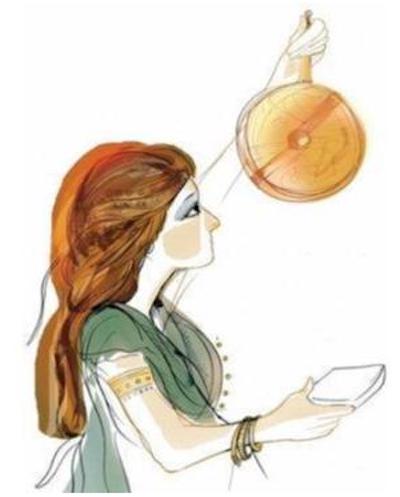
An illustration of Fatima using an astrolabe by Eulogia Merle, from She is an Astronomer, a calendar of female astronomers.
Fatima of Madrid (10th or 11th century) is believed to have been an astronomer and mathematician, who worked, wrote, and contributed to astronomical knowledge in medieval Spain. Although some scholars recognise her as a historical figure, others are unsure whether she ever existed or wrote the works credited to her.
As her name suggests, Fatima’s family was from Madrid. However, she and her father later lived in Cordoba, a city in Andalusia, southern Spain. Andalusia was controlled by the Muslim Caliphate from the eighth to twelfth centuries — making its culture completely different from other parts of Europe. In the tenth century, Cordoba was one of the biggest cities in Europe, boasting a huge mosque, a university, and more than 400,000 citizens. The Muslim world was a place of passionate intellectual inquiry, and Muslim thinkers were responsible for many advances in scientific, mathematical, and medical knowledge.
Fatima’s father, Maslama al-Mayriti, was born in Madrid, and was a true Renaissance man: he translated Greek texts into Arabic, edited an encyclopedia, introduced new techniques for surveying land, and founded a school for mathematics and astronomy. His daughter would have grown up learning about mathematics, geometry, and the stars, using astronomical equipment to look at the night sky.
The night sky was hugely important to medieval Muslims. The positions of the moon and stars determined what times they should pray and in what direction, when each month started and ended, and even what decisions emperors made. Fatima is said to have worked alongside her father to correct the astronomical tables that held this information, making them more accurate. It was hard work to track stars across the sky, but it made a huge impact on the world. Fatima is also said to have written about the astrolabe, an instrument used to measure the position of the stars, and trigonometry. Unfortunately, none of the works attributed to her have survived.
